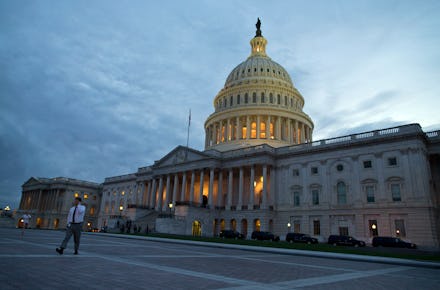Why Was the Government Shutdown? Millennials Know the Reason All Too Well

A good citizen is made, not born.
This is at least one assertion upon which both the ancient philosopher Plato and the present-day Center for Information & Research on Civic Learning & Engagement (CIRCLE) can agree. According to CIRCLE’s research, while millennials' involvement in volunteer services and advocacy work makes them the most “civically engaged” generation, they are also the generation that is least likely to be “politically engaged” and have a growing tendency to avoid electoral involvement altogether. While many institutions of higher education can barely keep up with the demand for more and varied service-learning opportunities, the right of younger persons to vote can barely be given away.
Despite this significant disinterest in the electoral scene, millennials are quite interested in pertinent social issues and are more likely than any other generation to be involved in advocacy work. Likewise, CIRCLE studies conclude that in comparison to other generations, millennials are more likely to turn to the government to solve problems. Yet, this same study illustrates that this generation devalues interpersonal trust. When these data points are considered concurrently, it should come as no surprise that while millennials expect more out of the government than previous generations, they are increasingly disillusioned by the conduct of elected officials.
Millenials are increasingly frustrated by the apparent lack of congressional efficacy. The obvious elephant in the room is the continuing government shutdown. USA Today reports that to many, the shutdown only perpetuates the perception that “electoral politics are an ineffective way to change the status quo.” If Congress can’t even come together to pass a budget, is it realistic to expect them to ever come to an agreement on legislation legalizing gay marriage? Certainly, the younger generation is as interested as ever in contributing to society in a meaningful way. However, for a growing number of millennials, “the current gridlock in Congress is further proof ... that a government career is not a viable way to make a difference.” The quickly waning desire of the younger generation to fill public positions brings into question the sustainability of our democracy. Since democracy is ruled by the people, it requires people to participate on all levels, not just as advocates for special-interest groups, but also as representatives of the people.
Those millennials who do still have a strong desire to serve this country in a public capacity cite this reasoning as part of their motivation. They hope to significantly change the tune of politics in Washington and hope that Congress can reorient itself so that its actions represent the desires of the electorate and not the party agenda.
If the assertion that a good citizen is made rather than born is true, then the current political climate certainly doesn’t teach us how to be good citizens, it does not demonstrate the citizenry’s political efficacy, nor does it portray government work as honorable or important. What millennials need from Congress is deliberative dialogue, in which disagreeing parties seek to come to a mutually acceptable agreement through cooperation, listening, and reasonableness. It is only though the restoration of faith in the government and a reorientation towards the building blocks of democracy that politically engaged American citizens can be made.